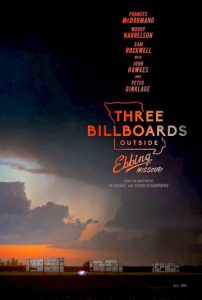
BY EYLÜL DOĞANAY (TRIN/III)
eylul.doganay@ug.bilkent.edu.tr
Last week I saw a movie. For the first time I felt like I saw the very souls of every single character and for the first time I looked up the composer behind the soundtrack of the movie. I found the name Carter Burwell, only to see that he was responsible for many other tracks used in many other productions. I added a few of the movies he worked on to my watchlist, and moved along to feed my own soul with “Mildred Goes to War,” the first sign of the good awaiting us. How can a sound sound so tired, passionate and filled with love at the same time? For the answer, go see the movie. To be aware of your kind, go see the movie. Do yourself a favor: to be enlightened, go and see this movie. (Now that the message is clear, I’ll proceed with the songs.)
When you pay attention to soundtracks, you’ll see that sometimes the same melody is adjusted to the pace of the scenes. In real life, there’s no music playing in the background, but it does get intense, or slows down. In TBOEM too, the songs “Mildred Goes to War,” “I’ve Been Arrested,” “Billboards On Fire” and “Billboards Are Back” are all variations of the same work. Whichever was the first to come up, and whatever they are as a whole, it’s fantastic. In fact, Mr. Burwell is currently an Oscar nominee because of them.
 “Buckskin Stallion Blues” is a song by Townes Van Zandt. In the movie, what I believe to be a cover by Amy Annelle also appears, and although it makes quite a bit of sense, I’ve just realized how different an impact can be created by simply using two versions, or interpretations, of a song. These two, in particular, set a great example of the contrast that can be produced, a beginning and an end maybe.
“Buckskin Stallion Blues” is a song by Townes Van Zandt. In the movie, what I believe to be a cover by Amy Annelle also appears, and although it makes quite a bit of sense, I’ve just realized how different an impact can be created by simply using two versions, or interpretations, of a song. These two, in particular, set a great example of the contrast that can be produced, a beginning and an end maybe.
“His Master’s Voice” by Monsters of Folk – okay, this is an easy one. This song would go with any of the happy–melancholic moments of life, even the one I’m experiencing as I write these lines. Under normal circumstances my living room is either dark (other than the light coming from my monitor) or well lit. Now I have this yellow night-light-ish thing on, and the room is cozy, feels like home, and I’m with a loved one, dozing off on the couch. Most scenes could welcome this song, as does the one in TBOEM: see the movie!
It’s a whole lot of firsts, isn’t it? It’s also the first time I’ve come close to opera. Never, ever in my life had I wondered what it would be like to listen to high-pitched singing for hours, most likely in a language I wouldn’t understand, in a majestic hall, surrounded by shimmering people. But now I do! “The Last Rose of Summer,” sung by Renée Fleming, may have brought me to my senses in terms of appreciating superhuman limits of singing. As I acknowledged the glory of opera, that of fire and revenge accompanied it. I’m sure songs by powerful voices have accompanied blow-ups, crashes and explosions before on the screen; I guess people do it because it works.
Every aspect of this movie works together. Being human, or life as it is, may not matter the tiniest bit in the universe, but since we are here, and we are – when what we can get from life is so abundant and intense – why not get it, feel it, use it…to create. What I mean by this short stream of consciousness is that sensations lead to expression, expression to works of art. Therefore, expressions are the feelings of others, at our disposal. Someone came up with this idea for a movie, someone wrote a script, someone looked through a lens and thought that what they saw was beautiful enough to share with the world, and someone asked Carter Burwell to express anger, regret, revenge, heart-burning, forgiving, helplessness, death, growing up, and choosing to do the right thing; or in other words, to make us hear what it is to be human.
